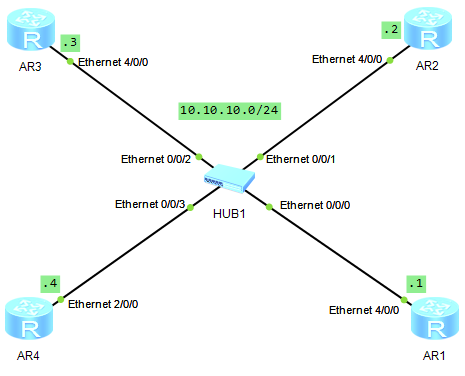Let’s check today how a Designated Intermediate System (DIS) is elected in broadcast network.
Unlike in OSPF, in ISIS, routers of the same level, in a network segment, set up adjacencies (including non-DIS routers). DIS, as a pseudo node also generates LSPs, to describe available routers in the network. A pseudo node is indentified by the system ID of the DIS and the 1-byte circuit ID, which is always not 0. The main task of DIS is to reduce the number of generated LSPs. Even though all routers set up adjacencies in an ISIS broadcast network, LSDBs are synchronized by the DISs. One router can be DIS either for Level -1 or Level 2 routers. It depends on DIS priority configured. You can configure different DIS priority for different levels. The highest priority means the router is elected as DIS. In case that all routers have the same DIS priority, the one with the highest MAC address is chosen as DIS. By default DIS priority is set to 64 and can be changed manually. Comparing to OSFP DR, the router with the priority 0 also takes part in DIS election. Each time you connect a new router with higher DIS priority, the new router is elected as the new DIS, which causes LSPs flooding.
Let’s leave theory and carry out a test of DIS election in ISIS broadcast network.
Based on the below topology configure, IP addresses for physical and loopback interfaces (it is omitted here).
Configure ISIS protocol on all routers. How to do this? Go to ISIS on Huawei routers.
You can add ISIS name for each router to simplify maintenance and troubleshooting (AR1 as an example):
[AR1]isis [AR1-isis-1]is-name AR1
Check ARP table for AR1 router to find out which router has the highest MAC address:
[AR1]dis arp int eth 4/0/0
IP ADDRESS MAC ADDRESS EXPIRE(M) TYPE INTERFACE VPN-INSTANCE
VLAN/CEVLAN PVC
------------------------------------------------------------------------------
10.10.10.1 00e0-fc0d-7860 I - Eth4/0/0
10.10.10.3 00e0-fc0d-e793 19 D-0 Eth4/0/0
10.10.10.4 00e0-fc06-db85 19 D-0 Eth4/0/0
10.10.10.2 00e0-fc0d-27df 19 D-0 Eth4/0/0
------------------------------------------------------------------------------
Total:4 Dynamic:3 Static:0 Interface:1
As we can see from the output, AR3 router’s MAC address 00e0-fc0d-e793 is the highest and will be elected as DIS. Why? Because DIS priority of all routers is set as defualt 64. Let’s check it:
[AR1]display isis peer
Peer information for ISIS(1)
System Id Interface Circuit Id State HoldTime Type PRI
-------------------------------------------------------------------------------
AR3 Eth4/0/0 AR3.01 Up 7s L1(L1L2) 64
AR4 Eth4/0/0 AR3.01 Up 28s L1(L1L2) 64
AR2 Eth4/0/0 AR3.01 Up 29s L1(L1L2) 64
AR3 Eth4/0/0 AR3.01 Up 8s L2(L1L2) 64
AR4 Eth4/0/0 AR3.01 Up 23s L2(L1L2) 64
AR2 Eth4/0/0 AR3.01 Up 28s L2(L1L2) 64
Total Peer(s): 6
[AR1]display isis interface
Interface information for ISIS(1)
---------------------------------
Interface Id IPV4.State IPV6.State MTU Type DIS
Loop0 001 Up Down 1500 L1/L2 --
Eth4/0/0 001 Up Down 1497 L1/L2 No/No
[AR2]display isis interface
Interface information for ISIS(1)
---------------------------------
Interface Id IPV4.State IPV6.State MTU Type DIS
Loop0 001 Up Down 1500 L1/L2 --
Eth4/0/0 001 Up Down 1497 L1/L2 No/No
[AR3]display isis interface
Interface information for ISIS(1)
---------------------------------
Interface Id IPV4.State IPV6.State MTU Type DIS
Loop0 001 Up Down 1500 L1/L2 --
Eth4/0/0 001 Up Down 1497 L1/L2 Yes/Yes
[AR4]display isis interface
Interface information for ISIS(1)
---------------------------------
Interface Id IPV4.State IPV6.State MTU Type DIS
Loop0 001 Up Down 1500 L1/L2 --
Eth2/0/0 001 Up Down 1497 L1/L2 No/No
AR3.01 – As it was mentioned earlier, a pseudo node is indentified by the system ID of the DIS and the 1-byte circuit ID, which is always not 0.
And now change DIS priority of AR1 to 100:
[AR1]int Ethernet 4/0/0 [AR1-Ethernet4/0/0]isis dis-priority 100 (Level-1-2 by default)
Let’s check what’s happend:
[AR1]dis isis interface
Interface information for ISIS(1)
---------------------------------
Interface Id IPV4.State IPV6.State MTU Type DIS
Loop0 001 Up Down 1500 L1/L2 --
Eth4/0/0 001 Up Down 1497 L1/L2 Yes/Yes
Now router AR1 has been chosen as DIS. As you can see, it is the DIS for both levels because all routers in our topology are Level-1-2 routers. You can test the same for hierarchical topology, changing circuit-type of some routers to Level-1 and Level-2. You can also change DIS priority for Level-1 or Level-2.
 Labnario Huawei From Scratch
Labnario Huawei From Scratch
